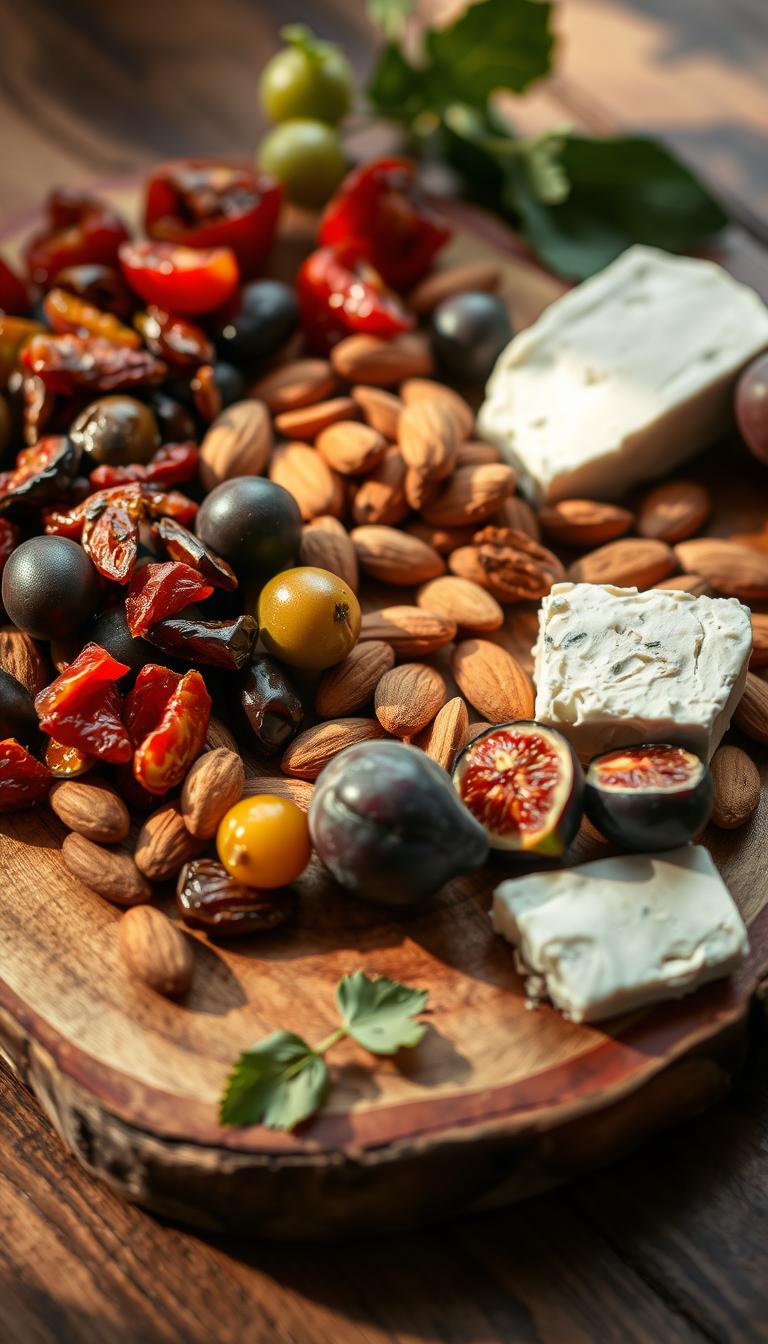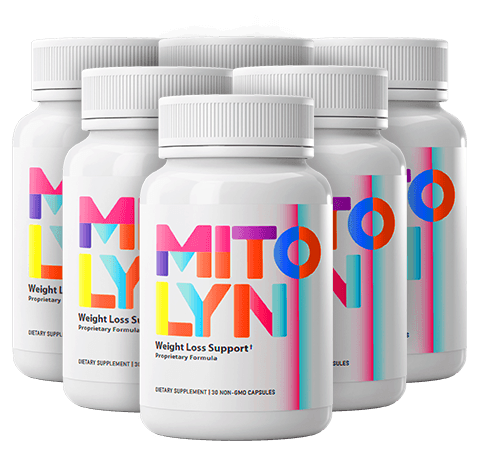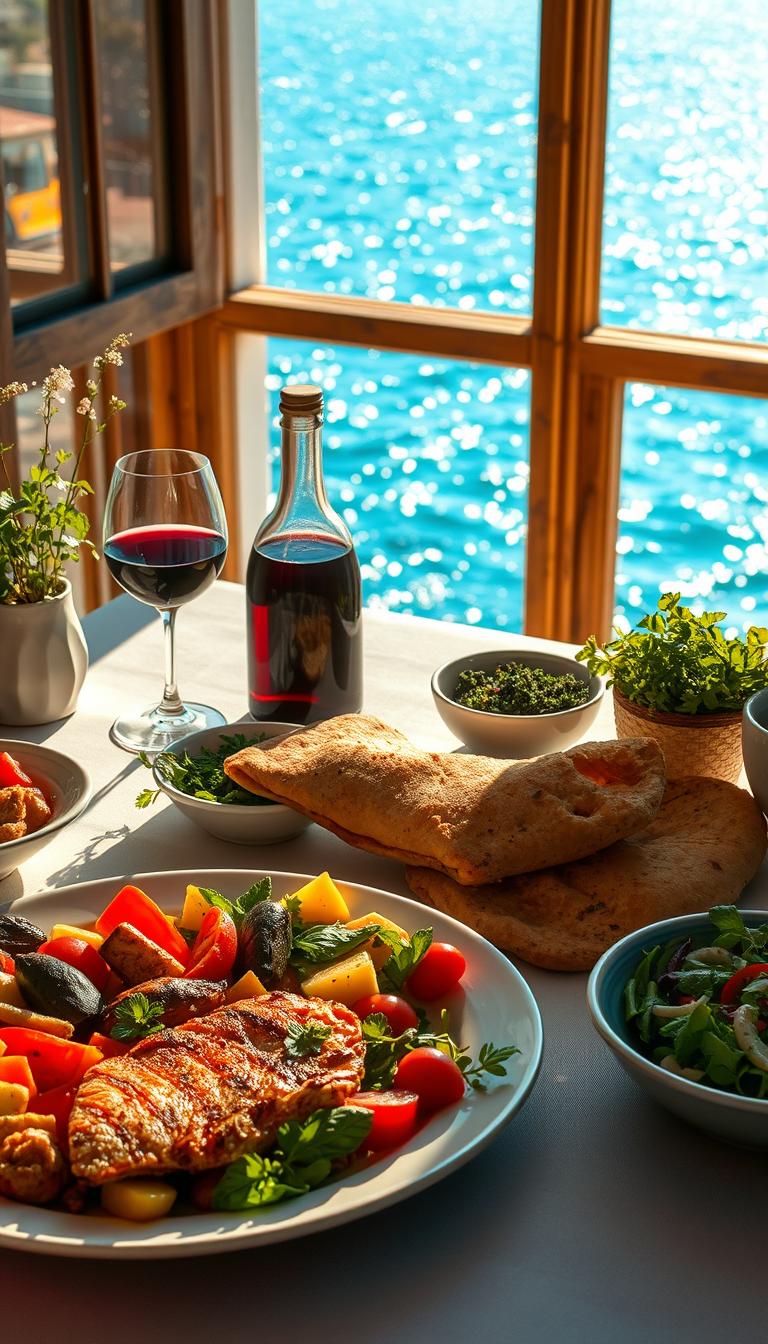
Imagine a way of eating that’s not just a diet but a vibrant lifestyle. The Mediterranean Diet Meal Plan combines flavor, flexibility, and wellness. It’s easy to follow and boosts heart health, brain function, and energy.
Are you ready to say goodbye to fad diets? This approach to healthy eating can change your plate and your life.
Key Takeaways
- Focuses on whole grains, veggies, fruits, and healthy fats like olive oil, with seafood twice weekly.
- Ranks #1 as Best Overall Diet by U.S. News & World Report since 2018 and easiest to follow in 2025.
- Includes 5 breakfasts, 5 lunches, and 4 dinners designed for busy schedules, with 2 hours of Sunday prep.
- Adaptable for dietary needs—swap dairy milk for almond milk or enjoy vegetarian meals weekly.
- Backed by science to lower heart disease risk, improve gut health, and support weight management.
What Is the Mediterranean Diet and Why It’s Popular
The Mediterranean diet comes from Greece, Italy, and Spain. It’s more than a diet; it’s a Mediterranean lifestyle. It’s loved for its tasty foods and health benefits.
The History and Cultural Significance
This diet is based on foods from the Mediterranean. It’s about eating whole foods. Families enjoy meals together, with lots of fresh produce and olive oil.
Key Components of the Mediterranean Diet
Here’s what makes it work:
- Plenty of vegetables, fruits, whole grains, and legumes
- Healthy fats like olive oil as the primary fat source
- Fish and seafood 2-3 times weekly
- Moderate amounts of dairy, eggs, and poultry
- Limiting red meat and sugary foods
| Food Group | Examples |
|---|---|
| Vegetables | Spinach, eggplant, artichokes |
| Fruits | Apples, figs, citrus |
| Proteins | Salmon, lentils, chickpeas |
Scientific Backing for This Eating Pattern
“The Mediterranean diet represents the gold standard in preventive medicine…”
Research like the PREDIMED trial shows it lowers heart disease risk. It’s a heart-healthy diet that fights inflammation and improves cholesterol. The US News calls it the best for health and easy to follow.
Health Benefits You Can Expect
Choosing a Mediterranean diet can change your life. It’s all about balanced nutrition. You get plant-based foods, healthy fats, and whole grains. Let’s see how it works:
- Heart protection: Studies show a 28–30% lower risk of heart disease.
- Inflammation reduction: Anti-inflammatory ingredients like olive oil and nuts ease chronic conditions.
- Brain boost: Better cognitive function and lower Alzheimer’s risk linked to its nutrient-rich foods.
- Weight loss support: Research confirms this diet helps maintain a healthy weight twice as effectively as other plans.

“Adhering to this diet reduced artery plaque buildup and cut early death risk by 80% in a study of 6,229 adults.”
Elaine lost 100 lbs and reversed pre-diabetes. The diet focuses on fiber-rich foods like vegetables, legumes, and whole grains. This helps with digestion and keeps you full longer.
By eating less red meat and processed foods, you keep your blood sugar stable. Fresh ingredients and moderation are key. You’re not just eating—you’re building a foundation for lifelong health.
Getting Started with Your Mediterranean Diet Meal Plan
Starting the Mediterranean diet means knowing what to eat and what to avoid. This balanced nutrition plan uses whole foods. It makes it easy to stick to without feeling trapped.
Essential Mediterranean Diet Food List
Fill your kitchen with these key items:
- Fresh produce: Dark leafy greens, tomatoes, eggplant, and seasonal fruits
- Whole grains: Brown rice, bulgur, and farro for hearty meals
- Plant proteins: Chickpeas, lentils, and tofu
- Healthy fats: Extra-virgin olive oil, walnuts, and almonds
- Fish and seafood: Salmon, sardines, and shrimp
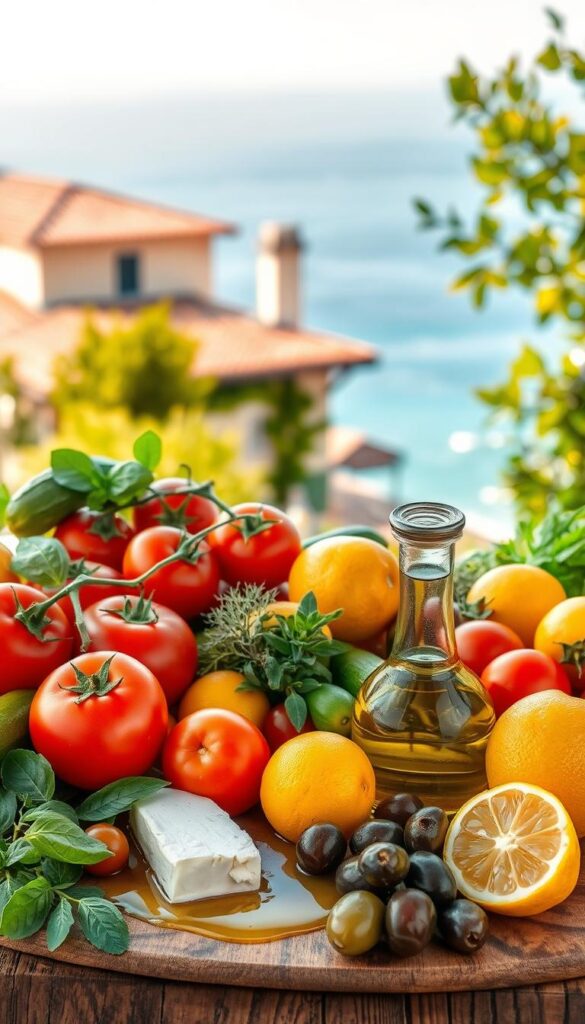
Foods to Enjoy in Moderation
Add these in small amounts for variety:
- Low-fat dairy: Greek yogurt or feta cheese in small portions
- Poultry: Grilled chicken once or twice weekly
- Eggs: 3-4 times a week as protein boosts
What to Avoid or Minimize
Limit these to follow the diet’s rules:
- Processed snacks, sugary drinks, and refined carbs
- Red meat: Opt for fish or legumes instead
- Salt-heavy foods: Use herbs like oregano or lemon for flavor
Make smart swaps to enjoy the diet more. Swap bacon for grilled chicken in salads. Use olive oil-based dressings. This guide helps you start a healthy Mediterranean cuisine lifestyle.
Your 7-Day Mediterranean Diet Meal Plan
Turn your kitchen into a flavor and nutrition hub with this Mediterranean Diet Meal Plan. It’s all about easy meals. You’ll enjoy whole foods, healthy fats, and fresh herbs. This keeps your taste buds excited and your body full of energy.
Every day, you’ll get fresh produce, lean proteins, and plant-based foods. They’re all ready in under 30 minutes.
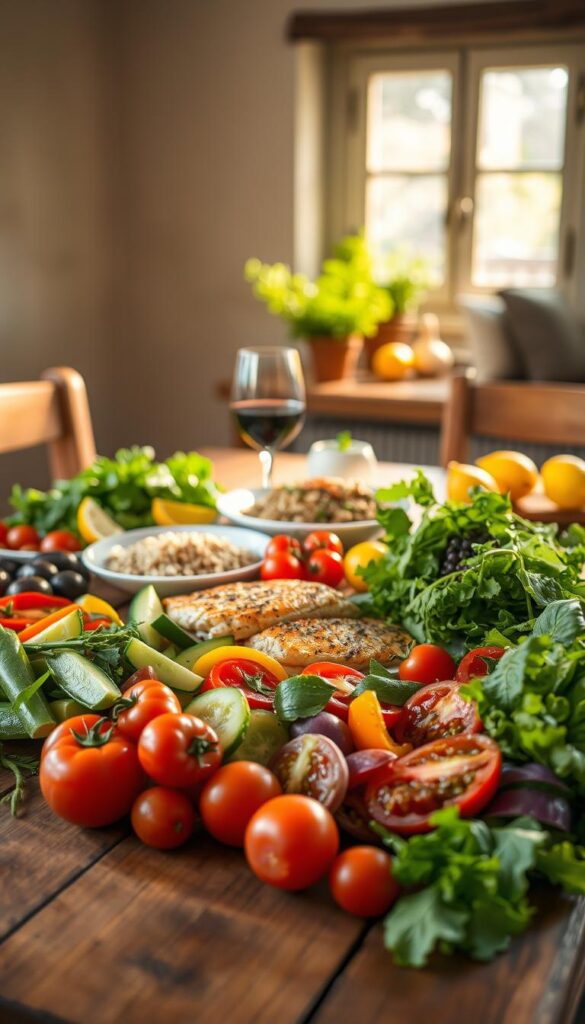
Breakfast Options That Fuel Your Day
- Start with Greek yogurt topped with honey and seasonal fruit
- Avocado toast on whole-grain bread with a poached egg
- Overnight oats with apricots, pistachios, and almond milk
Satisfying Mediterranean Lunches
Choose from:
- Canned salmon salads with capers and lemon
- Romaine lettuce wraps filled with roasted shrimp and quinoa
- Roasted vegetable grain bowls with feta and olive oil
Delicious and Nutritious Dinner Ideas
- Herb-crusted fish with Swiss chard and chickpeas
- Zucchini noodles tossed with garlic, olive oil, and cherry tomatoes
- Grilled chicken with roasted Brussels sprouts and lemon-garlic sauce
Smart Snacking the Mediterranean Way
Stay fueled with:
- Celery and carrots dipped in homemade hummus
- Rice cakes topped with almond butter and banana slices
- Trail mix combining walnuts, dried figs, and dark chocolate chips
Prep ahead by storing veggies and proteins in airtight containers. Batch-cook grains like quinoa or bulgur for quick assembly. This plan gives you 33g of fiber and 99g of protein daily. It keeps you full and focused.
Adjust portions for 1,500 or 2,000 calorie goals. Let’s make Mediterranean eating your new everyday routine!
Mediterranean Recipes Anyone Can Make
Explore Mediterranean recipes that make simple meals tasty. No need for hard steps—these easy meals are perfect for beginners. Try spanakopita shakshuka or tofu stir-fry with veggies. These dishes are easy to make and healthy.

| Recipe | Highlights | Prep Time |
|---|---|---|
| Greek Yogurt Breakfast Bowl | Honey-drizzled yogurt with granola and berries | 5 mins |
| One-Pan Salmon & Veggies | Salmon fillet roasted with cherry tomatoes and olives | 20 mins |
| Chickpea Salad Sandwich | Cucumber-tahini spread with mixed greens | 15 mins |
| Slow-Cooker Minestrone | Zucchini, beans, and tomatoes simmered in broth | 30 mins |
| Avocado Feta Toast | Whole-grain bread topped with avocado, feta, and red pepper flakes | 10 mins |
Each dish uses common ingredients and fresh veggies. Feel free to change things up—add garlic, try different grains, or mix greens. Cooking in bulk, like quinoa or marinades, saves time. With these Mediterranean recipes, you can enjoy healthy meals without losing flavor. Your next easy meals are just a grocery list away!
Meal Prep Strategies for Busy Lifestyles

Following a Mediterranean Diet Meal Plan doesn’t mean spending hours cooking. Here are some meal prep tips to make it easy and quick:
Weekend Prep for Weekday Success
- Save 1-2 hours on Sunday to prep veggies and cook grains like quinoa or brown rice.
- Make soups, stews, or lentil dishes ahead for quick dinners during the week.
- Prepare breakfasts like overnight oats or yogurt parfaits for easy mornings.
Storage Tips for Maximum Freshness
Keep your prepped food fresh with these tips:
| Food Type | Storage Method |
|---|---|
| Leafy greens | Wrap in damp paper towels before refrigerating. |
| Cooked grains | Port into airtight containers for up to 5 days. |
| Herbs | Freeze in ice cube trays with olive oil for future use. |
Time-Saving Mediterranean Cooking Hacks
Save time with these smart tips:
- Use canned chickpeas or black beans (rinsed) instead of soaking dried legumes.
- Choose frozen veggies for salads or stir-fries when fresh is too expensive.
- Make sheet-pan dinners: Toss veggies and protein with olive oil, roast, and portion into containers.
Use these steps with a Mediterranean Diet Meal Plan to make meal prep easier. Start with just 3 days’ meals and increase as you get better. Remember, it’s all about consistency, not perfection!
How to Adapt the Mediterranean Diet for Weight Loss
Start by making small changes to the Mediterranean Diet for weight loss. Eat more veggies, legumes, and lean proteins. Cut down on nuts and olive oil, but still enjoy them in moderation. Studies show this can lead to losing up to 8.7% of your body weight.

- Swap larger olive oil drizzles for a light spray.
- Increase leafy greens in meals to boost fiber and fullness.
- Track portions of nuts and seeds to keep calories in check.
- Choose grilled fish or chicken over fatty cuts of meat.
Over the past year, many have lost 35+ pounds by pairing this diet with mindful eating and intermittent fasting. It’s not about deprivation—it’s smart swaps.
Stick to 1,200–1,800 calories daily, depending on your goals. Eat protein-rich meals like Greek yogurt parfaits or salmon salads to stay full. Replace sugary snacks with veggies and hummus or apple slices with almond butter. This method beats low-fat diets because it focuses on healthy eating and feeling full.
Need to add calories? A handful of nuts or a drizzle of tahini is okay. Just remember to drink water and walk for 30 minutes to get the best results. Small changes lead to big habits without extreme diets.
Beyond Food: Embracing the Full Mediterranean Lifestyle
The Mediterranean lifestyle is more than just food. It’s about living a balanced life filled with joy and health. Let’s see how to make these habits part of your day.

The Importance of Physical Activity
Traditional Mediterranean cultures love to move. Here’s how you can too:
- Walk instead of driving short distances
- Try gardening or light yard work
- Use dancing or yoga to relax
These small steps can make a big difference in your heart health and energy.
Social Aspects of Mediterranean Living
“Sharing meals strengthens bonds and health.”
In Mediterranean areas, meals are for sharing. Try these:
- Have family dinners every week
- Cook with friends
- Go on outdoor picnics on weekends
These activities help you connect while enjoying healthy food together.
Mindful Eating Practices
Eat slowly and enjoy each bite. Take a moment before getting seconds. And don’t eat in front of screens. This way, you:
- Listen to your body’s hunger
- Get the most out of your food’s flavors
- Avoid eating too much
| Pillar | Benefits | Examples |
|---|---|---|
| Physical Activity | Heart health | Walking, gardening work |
| Social Eating | Stronger relationships | Family meals, potlucks |
| Mindful Eating | Better digestion | Slow eating, no distractions |
Making small changes in your daily life can change how you see food and life. The Mediterranean lifestyle is not just a diet. It’s a way to live that nourishes your body and soul.
Conclusion: Making the Mediterranean Diet a Sustainable Part of Your Life
The Mediterranean lifestyle is more than just a diet. It’s about enjoying tasty food that’s good for you and the planet. Start by swapping butter for olive oil or adding more veggies to your meals.
This way of eating focuses on whole foods like nuts, fish, and fresh produce. It’s easy to fit into your life and taste.
Remember, the Mediterranean diet is all about balance. Eat more plant-based foods, have moderate amounts of dairy and lean proteins, and enjoy treats now and then. This way of eating is recognized by UNESCO for its cultural value and health benefits.
Choosing local, seasonal ingredients helps the environment and supports local farmers. Small changes like meal prepping or trying new recipes can make this lifestyle a lasting part of your life.
Every choice you make, like cooking fish twice a week or sharing meals with family, helps your health. The Mediterranean diet is flexible, so you can enjoy its benefits without strict rules. Start today and your health and the planet will be grateful.
FAQ
What foods are included in the Mediterranean Diet?
The Mediterranean Diet focuses on many foods. It includes fresh veggies, fruits, whole grains, and legumes. It also has nuts, seeds, and healthy fats like olive oil.
It suggests eating fish, poultry, and dairy in moderation. But, it advises eating less red meat and sweets.
Is the Mediterranean Diet effective for weight loss?
It’s not just for losing weight. But, many people find it helps them stay at a healthy weight. This is because it focuses on whole foods and portion control.
How does the Mediterranean Diet benefit heart health?
It’s great for your heart. It can lower cholesterol and blood pressure. It also reduces the risk of heart attacks and strokes.
This is thanks to its healthy fats, fiber, and antioxidants.
Can I follow the Mediterranean Diet if I have dietary restrictions?
Yes, you can! The Mediterranean Diet is flexible. You can find substitutes for foods you can’t eat. This way, you can still follow the diet’s principles.
How can I prepare meals in advance for the Mediterranean Diet?
Spend a few hours on weekends to prep. Wash and chop veggies, cook grains, and make soups or stews. Store them in the fridge or freezer.
This makes it easy to make healthy meals during the week.
What are some easy Mediterranean recipes to start with?
Try simple dishes like a Greek salad, hummus, and baked fish with veggies. Also, lentil soup and pasta with fresh ingredients are good choices. These recipes are easy and quick to make.
How do I incorporate physical activity into the Mediterranean lifestyle?
Start with activities like walking, gardening, or joining a class. Mediterranean cultures value movement in daily life. You can easily add it to your routine.
What are mindful eating practices I can adopt?
Mindful eating means enjoying meals without distractions. Savor the flavors and textures. Pay attention to when you’re hungry or full.
This makes eating more enjoyable and helps you eat healthier.







